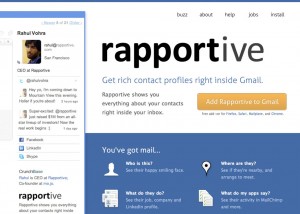Making Gmail even better: just add Rapportive
A short, practical one today.
If, as I do, you enjoy the flexibility and features of gmail, please consider adding rapportive (an add-on that works in Safari, Firefox, and Chrome).
In a nutshell it displays information in a sidebar about the person who sent or received the email you are looking at, including social media, previous email exchanges, and photo. It’s a godsend if you can’t quite remember who someone is, and helps you keep up with what people are doing.
Oh, and did I mention it’s free?
August 2012 blogging challenge
The last few months have been very busy for me, and I have neglected this blog terribly.
I just finished my grades for this semester at the university, so I am looking forward to a couple of months working on projects that had been pushed onto the back burner. One of those projects is this blog.
In order to get back into the swing of things, I am going to post something every weekday this month, starting with this post today.
blogging curriculum EFL evaluation expectations Language learning teaching testing theory
by sendaiben
leave a comment
Are we stealing dreams?
Seth Godin, who is an internet/new media/publishing/idea guru, just published a manifesto aimed at starting (or continuing) a conversation about the future of education. Very much in the same vein as Ken Robinson’s famous TED talk on the same subject, Stop Stealing Dreams (what is school for?) is a 30,000 word ebook that is currently available for free. Based on his previous work, it’s probably worth your time.
To blog or not to blog…
As well as teaching, I am also interested in minimalism, passive income, and social media. The conventional wisdom in blogging/online communities is that it is necessary to have and actively manage an online presence. Write a blog, be active on Facebook, Twitter, and Linkedin: all with the ultimate goal of building a tribe and enhancing your credibility. If all goes well, this will lead to fulfillment and opportunities for professional advancement.
However, does this transfer to the ELT world?
My friend John Wiltshier does not have a blog. Instead he spends his time and energy creating textbooks and presenting to teachers.
Paul Nation does not have a blog, but that has hardly stopped him influencing language teachers all over the world.
Tim Murphey does not have a blog, although you can find his website here.
Scott Thornbury does have a blog, although he doesn’t update it very often (on the blogging scale of things, at least). Barbara Hoskins Sakamoto has a hugely successful blog, although she seems to be focusing on guest posts recently.
So what lesson to draw from all of this? Is blogging (regardless of its intrinsic rewards) something that is worth doing? Or is it, as some of my more pragmatic friends put it, a waste of time?
A lot of the time I feel I should shut down the browser and settle down to some ‘serious’ work: some official publications that I can put on my resume. Right now, in Japan at least, your blog or online presence will probably count for nothing when applying for jobs. Even the most cursory ‘kiyo’ (internal university journal) article would trump years of online writing when applying for a university position.
Thinking about the opportunity cost, the few hours a week I spend on this could probably be better employed elsewhere…
So what do you think? Blogging, from a professional point of view, worth it or not?



